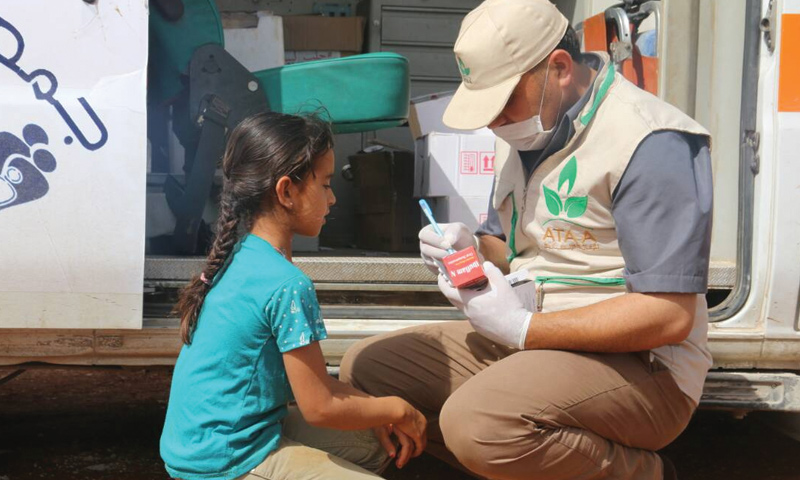



“Ataa Association for Humanitarian Relief” has announced launching a project “to bridge the gaps created by the bombardment of regular medical centers in the eastern and northern countryside of Hama and the northern countryside of Idlib.
The project, which began early last May, is a number of cars that provide medical and healthcare services to the people in the refugee camps in Northern Syria and the areas that have a massive population due to the large number of people that were forcedly displaced to them from Eastern Ghouta in particular.
Talib al-Hamsho, the director of the medical department at “Ataa Association,” said that the project aims to overcome the shortage in the medical sector due to the shelling that targeted the centers and fixed medical points, as well as losing many of the staff members who died in the bombardment.
He told Enab Baladi that the mobile clinics offer their services in a periodical manner and for free; they cover many medical specialties, on top of which are pediatrics, gynaecology and internal diseases, in addition to providing the patients with free of charge medications.
According to the Association’s statistics, the number of the people who are benefiting from a single mobile clinic ranges from 100 to 150 patients every day, between 2000 to 2500 patients each month. In 2017, the number of the people who benefited from the services of Ataa’s mobile clinics reached 41 thousand patients and 78 thousand given medications.
The number of patients received by the clinics varies depending on the military operations and shelling targeting the area, said Talib al-Hamsho.
The Mobile Clinics Project stopped working at a certain point due to lack of funding, but it resumed its action after being sponsored by the “International Pitying Hearts” Society, which operates in Palestinian. The Society will be funding the project to the of 2018.
Al-Hamsho said that the need for mobile clinics came in response to the forced displacement movements witnessed by the Northern Syria from Darayya, Zabadani, Homs and Eastern Ghouta. He pointed out that the clinics receive patients and provide medical services to them in the refugee camps, including “Mizanaz” camp, “Saed” camp the “Zero Point “and other camps and areas with large numbers of evacuees and forcibly displaced.
According to the medical director, the main objective of the project is to facilitate civilian’s access to medical services, especially in remote areas, to avoid the danger they may be exposed to in the fixed medical points that are permanently targeted, as well as early detection of new epidemics and diseases that may spread in the camps and populated areas.
The medical institutions and staffs have been a constant target for hostilities and violence since 2011, for the “Syrian Human Rights Network” has, since the beginning of 2018 until early in April, documented the killing of 61 medical personnel in Syria, 40 of whom were killed by the Syrian regime.
The number of attacks on vital medical centers in Syria, in 2017, reached 243 incidents, which killed at least 112 medical staff members working for the Syrian Red Crescent and the Civil Defense.
if you think the article contain wrong information or you have additional details Send Correction